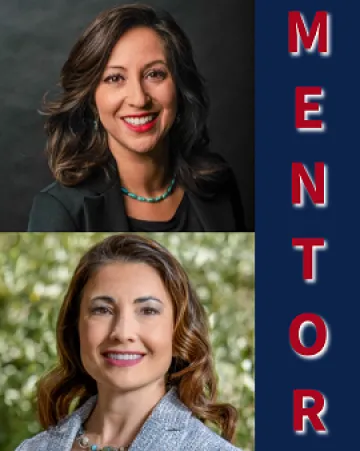Empowering MENTORship at UArizona

Dr. Andrea Romero (top), Vice Provost for Faculty Affairs, and Tara Chandler (bottom), Assistant Director of the MENTOR Institute, spoke with the Graduate Center about the Institute's mission and how it supports graduate students.
Mentorship plays a pivotal role in guiding individuals toward success. At the University of Arizona, the MENTOR Institute has taken an innovative approach, placing inclusivity at the forefront. In a recent interview, Dr. Andrea Romero and Tara Chandler shared valuable insights into their vision, strategies, and the impact of their work. Read more for what we learned, including tips and resources for both mentors and mentees.
Mentorship Reimagined
The MENTOR Institute (Mentorship through Effective Networking, Transformational Opportunities, and Research) reimagines the traditional model of mentorship. At the heart of its approach is the recognition that individuals benefit from a constellation of relationships. Peer mentors and mentoring communities create collaborative, less hierarchical relationships that foster open communication and a shared journey toward personal and professional growth. This concept, known as the "mentoring universe," offers a holistic and adaptable approach, accommodating the diverse needs and comfort levels of individuals at different stages of their careers.
Positive Impact on Graduate Students
While the MENTOR Institute is relatively new, its impact is already evident. The institute recently honored three faculty members for their exceptional mentoring of graduate students, and it recognized a doctoral student, Romy Cerón Canché, for her outstanding peer mentoring contributions. Additionally, institute Fellows, including graduate students, are actively working to improve the mentoring culture on campus. The new institute has introduced comprehensive training programs, attracting numerous graduate students who see the value in honing their mentorship skills. The training empowers individuals to create and navigate mentoring partnerships effectively and is divided into two levels.
Level 1: Online Training
"MENTOR Institute Online Training" is a foundational resource available on EDGE Learning. The asynchronous program takes approximately 45-60 minutes to complete, making it easily accessible and convenient. Through a variety of engaging activities, participants learn about building their mentoring universe, the roles and responsibilities of mentors and mentees, and the top 10 tips for building a successful partnership. They also gain valuable insights and tools for establishing cultural awareness, strategically planning goals, navigating difficult conversations, and celebrating successes.
Level 2: Synchronous Training
Building upon the concepts introduced in Level 1, "MENTOR Institute Synchronous Training" offers participants the opportunity to delve deeper into the practical application of mentoring principles. This resource can be accessed either in-person or online via Zoom, with each session lasting 60 minutes. Participants develop a mentoring philosophy, engage in discussions about their academic stories, and participate in role-playing exercises that lead to the creation of a mentoring agreement. Importantly, Level 1 training serves as a prerequisite for Level 2, ensuring that participants have a strong foundation before diving into advanced mentoring concepts.
Both resources are designed to equip mentors and mentees with the skills and tools necessary to establish, develop, and sustain meaningful collaborations. They promote a culture of inclusivity and cultural awareness, ensuring that the unique backgrounds and experiences of all participants are valued and respected. These training programs are at the core of the MENTOR Institute's mission to foster reciprocal and effective mentorship practices.
Sharing Academic Stories
Understanding the motivations and aspirations behind each person's academic journey strengthens the sense of community and drives excellence. The institute encourages mentors and mentees to share stories, including inspirations, successes, and failures. This establishes empathy and commonality. It enables mentees to understand that their mentors once walked the path they are on. By emphasizing reciprocity and relationships, the MENTOR Institute aims to enhance the impact of faculty members’ work and the success of graduate students.
Accessing Resources and Getting Involved
For those interested in engaging with the MENTOR Institute, a wealth of resources and opportunities await. The institute's website offers comprehensive information on mentor awards, nominations, and direct links to their training programs on EDGE Learning.
Tara Chandler, Assistant Director of the MENTOR Institute, is happy to assist and answer any questions. She and others who designed the institute are committed to creating a more inclusive and impactful environment for faculty and graduate students. Highlighting collaboration, cultural awareness, communication, and inclusivity, their innovative approach promises to shape the future of mentoring at the University of Arizona.

